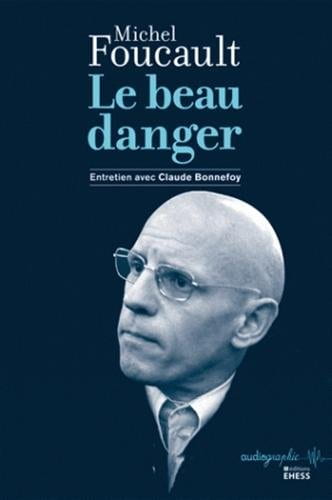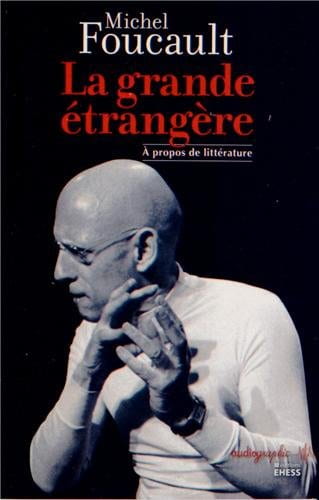by guest contributor Michael C. Behrent
Few living thinkers have been as prolific as the dead Michel Foucault. In the thirty-two years since his death, he has published thirteen book-length lecture courses, four volumes of interviews and papers (totaling over 3,500 pages), and countless bootlegs. Meanwhile, the fourth volume of his History of Sexuality, completed shortly before his death, sits, inaccessible to all, in an archive in Normandy—a rare text to have found no way around his estate’s prohibition on posthumous publications.
His will notwithstanding, one can only imagine that Foucault himself would have reacted to this state of affairs with a caustic laugh. For as two recently published volumes remind us, Foucault was haunted by the bond between language and death, as well as the notion that writing always, in a sense, comes from “beyond the grave.”
 The two books in question both appear in a series put out by the Éditions de l’École des hautes études en sciences sociales called Audiographie, which publishes texts that were first delivered in a spoken form. La grande étrangère (The Great Foreigner, 2013), consists of a radio program on madness and literature from 1963, two lectures on literature given in Brussels in 1964, and a talk on the Marquis de Sade delivered at SUNY Buffalo in 1970. The other, Le beau danger (The Beautiful Danger, 2011), is the transcript of an extended interview on the theme of writing that Foucault gave to the literary critic and journalist Claude Bonnefoy in 1968, but which has never before appeared in print.
The two books in question both appear in a series put out by the Éditions de l’École des hautes études en sciences sociales called Audiographie, which publishes texts that were first delivered in a spoken form. La grande étrangère (The Great Foreigner, 2013), consists of a radio program on madness and literature from 1963, two lectures on literature given in Brussels in 1964, and a talk on the Marquis de Sade delivered at SUNY Buffalo in 1970. The other, Le beau danger (The Beautiful Danger, 2011), is the transcript of an extended interview on the theme of writing that Foucault gave to the literary critic and journalist Claude Bonnefoy in 1968, but which has never before appeared in print.
If there is a common theme linking these interventions, it is that of Foucault’s obsession with the connection between writing and death. The texts in these volumes all deal with literature and writing; the problem of death figured prominently in the literary essays that Foucault, in the 1960s, devoted to Bataille, Blanchot, and Roussel. Yet what the Audiographie books make clear is that the problem of literature and death was not, for Foucault, some esoteric side problem. It was integral to the ideas he was developing in his major publications. Thus modern literature exemplifies, Foucault maintains, the fact that the modern mind is steeped in what, in The Order of Things (1966), he dubbed the “analytic of finitude.” One of the many consequences of the growing consciousness of the radically finite character of human existence that follows the death of God is, he argues, the enormous significance that modern society assigns to literature. The value we attribute to literature is inseparable, Foucault suggests, from a cultural horizon shaped by human mortality.
In the 1964 Brussels lectures, Foucault contends that early modern Europe (during what he calls “the classical age”) did not, strictly speaking, have literature—at least in the way we have since come to understand the term—for the simple reason that it interpreted itself culturally as the tributary of the word of God. People in this period, of course, wrote novels. Some even experimented with the kind of knowing self-consciousness about their own literary artifices—referring in writing to the fact that they were writing—that would later become associated with literary modernism (Foucault offers a fascinating analysis, for instance, of Diderot’s Jacques le fataliste). Yet what distinguishes these earlier endeavor from the literature of the modern age is the fact that, during the classical age, “any work of language existed as a function of a certain mute and primitive language, that the work was charged with restoring.” This “language that [came] before languages” was the “word of God, it was the truth, it was the model” (La Grande étrangère, 100). Rhetoric was the means through which human utterances, in all their obtuseness, could acquire something of the limpidity of divine speech. But what we have come to call literature only emerges once God has died—or become dumb, to be precise. Literature is the attempt from within the unremitting chatter of discourse to mark language, to dent it, possibly to re-enchant or overcome it—hence modern literature’s frequently transgressive character. But once it has ceased to represent the word of God, once it has become simple the words filling a page, literature becomes an emblem of human finitude. As such, it cannot be other than “beyond the grave” (104).
Foucault’s claim that, strictly speaking, literature does not exist as an independent realm of discourse until the late eighteenth century parallels the claim he would soon make in The Order of Things that “man” (in the sense of the “human”) did not exist as a specific object of knowledge until the same period. The birth of the human sciences and the genesis of literature are both, Foucault, maintains, consequences of t God’s retreat.
The problem of writing also lies at the heart of Foucault’s 1970 lecture on Sade. His question is simply: why did Sade write? What compelled him to fill volume after volume with his transgressive yet mind-numbingly repetitive fantasies? Foucault’s analysis is characteristically complex, yet his argument harkens back, however indirectly, to the themes of the Brussels lecture. Sade’s libertinism is, needless to say, directed against God. Yet it is not atheistic as such; God is not dismissed as mere illusion. God, Sade believes, exists, but as an abomination, as evidenced by the “meanness” (méchanceté) of the world—and indeed, by the fact that there are libertines. In Sade’s peculiar logic (which Foucault calls “anti-Russellian” [199]), it is because God is abominable that it is necessary that he not exist. This theme illustrates what Foucault sees as the ultimate function of Sade’s writing: the intertwining of discourse, truth, and desire. Sade needs God “insofar as he does not exist, and insofar as he must be destroyed at each instant” (204), as both his writing and his desire depend on him.
 The reason Sade wrote is thus because in discourse, truth and desire become enmeshed in spirals of reciprocal stimulation and impulsion. Yet his originality, Foucault claims, lies in the way he emancipated desire from truth’s tutelage, pulling it out from under “the great Platonic edifice that ordered desire on truth’s sovereignty” (218). The point is not (as with Freud) that desire has its own truth, which is more or less hypocritically covered up by social norms; it is also, Foucault seems to be saying, that truth is a form of desire. Truth is not the neutral and transparent element through which words can name beings. It is a libidinal force, as seen in Sade’s relentless insistence, despite his novels’ preposterous plots, that he is telling the truth. Foucault’s account of the truth function in Sade recalls the themes of his first Collège de France lectures, on the “will to knowledge” in ancient Greece, which he would deliver the following year: the sophists, who believed that arguments are not proven logically, but won or lost like battles, resemble in many ways Sade’s approach to writing. Language, here, is no longer just a rumbling murmur that literature seeks to transform into a voice. God is dead, and we—or our truth-creating discourse—have killed him.
The reason Sade wrote is thus because in discourse, truth and desire become enmeshed in spirals of reciprocal stimulation and impulsion. Yet his originality, Foucault claims, lies in the way he emancipated desire from truth’s tutelage, pulling it out from under “the great Platonic edifice that ordered desire on truth’s sovereignty” (218). The point is not (as with Freud) that desire has its own truth, which is more or less hypocritically covered up by social norms; it is also, Foucault seems to be saying, that truth is a form of desire. Truth is not the neutral and transparent element through which words can name beings. It is a libidinal force, as seen in Sade’s relentless insistence, despite his novels’ preposterous plots, that he is telling the truth. Foucault’s account of the truth function in Sade recalls the themes of his first Collège de France lectures, on the “will to knowledge” in ancient Greece, which he would deliver the following year: the sophists, who believed that arguments are not proven logically, but won or lost like battles, resemble in many ways Sade’s approach to writing. Language, here, is no longer just a rumbling murmur that literature seeks to transform into a voice. God is dead, and we—or our truth-creating discourse—have killed him.
Yet at least according to Foucault’s position in Le Beau danger, language—or at least writing—has less to do with killing than with—as he put it in Madness and Civilization—the “already thereness of death” (“le déjà là de la mort”; cf. Histoire de la folie à l’âge classique (Paris: Gallimard, 1972 [1961]), 26). Foucault explains: “I would say that writing, for me, is tied to death, perhaps essentially to the death of others, but that does not mean that writing would be like murdering others,” in a way that “would open before me a free and sovereign space.” Writing, rather, means “dealing with others insofar as they are already dead. I speak, in a sense, over the corpses of others. I must confess, I kind of postulate their death” (Le Beau danger, 36-37).
In this sense, the death of God, Foucault suggests, is not only the cultural situation that his thought attempts to assess; it is the condition of possibility of his own work. The idea of writing as a form of resurrection, a way of rendering present the “living word” of “men and—most likely—God” is, he says, “profoundly alien” to him. Writing, for Foucault, is “the drifting that follows death, and not the progression to the source of life.” He muses: “It is perhaps in this sense that my form of language is profoundly anti-Christian”—even more so than themes that he addresses (39).
In these texts, the reader will find few of the concepts for which Foucault is best known. There is no or little mention of archaeology, epistemes, genealogy, or power (discourse is the one exception, though it is discussed in a far less technical manner than in, say, The Archaeology of Knowledge). What they remind us of are the philosophical preoccupations that presided over his early work—and that no doubt continued to shape his later thought, works such as Discipline and Punish and The History of Sexuality, albeit in a more subterranean way. Here, we have a Foucault concerned with finitude, mortality, and the death of God. Perhaps this Foucault is in need of—how else to put it?—resurrection.
Michael C. Behrent teaches modern European history at Appalachian State University. He is currently working on a book exploring the origins of Foucault’s project.



Leave a Reply